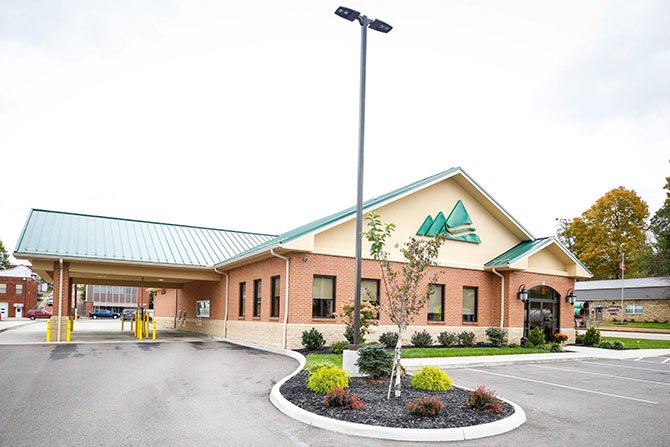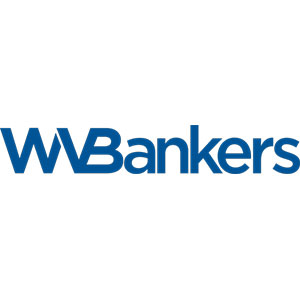On Dec. 21, 1896, W. E. Chilton, Secretary of State, issued a charter to the Pleasants County Bank with an authorized capital of $25,000. Incorporators were Newton Ogdin, Dr. A. S. Grimm, Dr. George T. Gale, I. O. Reynolds, C. C. Schauwecker, John Schauwecker and D. W. Reynolds. At the time, St. Mary’s was a small town of 800 inhabitants, and the town had few public improvements: no city water, sewers or electricity. The bank opened for business on March 15, 1897, after selling stock, securing equipment, banking rooms and setting up necessary books.
They opened for business at 217 Second Street just below the old Post Office building.
Over the years, the town continued to grow with paved streets, a water and sewerage system, good schools and churches, and a bright future. And Pleasants County Bank grew along with it, providing deposit and loan services to the community.
From a humble beginning, the Pleasants County Bank has grown into a strong financial institution. The bank and its board take pride in the part they have played in the development of their community, and they look forward with confidence.
One of the things that makes PCB unique is that its charter remains true to the first bank that opened in 1897 – its ownership has been continuous, and a family member of the original founder has always served on the board.
In a world where true community banks are decreasing in numbers and charters are sold, the legacy of PCB is really in its succession planning willingness of its leadership to put the bank and the needs of their community first.
As Pleasants County Bank completes over 125 years of service to the St. Mary’s, Belmont and surrounding area, Mike Nelson, President of the bank for the past 20-plus years, retires and Mark Bias takes the reigns. WVBA had the opportunity to meet with both gentlemen and talk about their perspectives on community banking, PCB’s future, and their role in it.
Mike Nelson
Mike Nelson served as President of PCB from Jan. 1, 2001, to this past fall, completing just over 20 years. Mike’s professional career spans 50 years, starting from when he applied for his first banking job at Union Trust Bank in Parkersburg during winter break while in college. He loved the business from day one and transferred to evening college classes so he could work during the day.
In 1997, he joined PCB, when their then President, Leo Tullis, was looking towards retirement and wanted to hire and mentor his replacement.
Q: What inspired you to become a banker?
Banking wasn’t a conscious career choice. I loved math. When I enrolled in college, the goal was to eventually find a job in the accounting field. However, banking found me through a job during my winter break. I loved the industry immediately and knew I had found my career path.
Q: What has been the most enjoyable part of your time at PCB?
Running a community bank is just like running a small business – you get to be involved in so many things, which has been wonderful.
By far, however, have been the relationships that I have with the customers of the bank. I have been fortunate; my career in banking has been in the same community, so my relationships with my customers span decades. As community bankers, we have boots on the ground, so to speak. I have personally helped businesses start and watched them grow and thrive and be passed on to the next generation. In many cases, we have multi-generational banking relationships and it’s not something that I have ever taken lightly. It’s been a privilege to be part of our customers’ lives.
Q: What has changed in the industry since you started?
I think you can sum it up in two words: the computer. Technology has changed the landscape.
Back when I started in banking, we had people that filed checks in filing cabinets. It was labor-intensive and took time. The technology changes have all happened in the last twenty years. It’s been an incredible thing to have been a part of.
ATMs are critical. Websites. Online banking. Bill Pay. Remote deposit. All these things opened up opportunities for community banks. As people leave small towns for college or job offers, they don’t need to leave their banking relationship behind – our customers can bank with us regardless of where they go. That’s been a game-changer.
Q: What would you say the draw is for careers in banking for younger people?
Well, as an industry, we – like so many other industries – need to look towards attracting talent into the field. When I started out in banking, the path was pretty much an upward trajectory: you started in a lower position and grew within the ranks.
Today, young people are coming out of college well-educated and banking offers many career paths, such as jobs in finance, IT, lending, and investments. The list is long, the opportunities are there, but many times overlooked, as banking may not be top of mind. I think we need to do a better job of educating young people about the field.
Q: As you look back at your career, what’s the mark you made?
Back in 2017, we built a new main office and spent a lot of money. After 115 years at the 323 Second Street home, the new main office facility opened at 215 Washington Street. PCB wants to be a part of our community for a long time to come, and I think this investment helps us to do that.
Overseeing this project, was an especially enjoyable part of my career.
I also, after 20 years, retired as President of the Pleasants County Development Authority, focusing on local economic development. We were able to pull off some very nice projects.
I would also say the relationships I was able to form and retain. For those of us that have been mentored – and I was by some of the best – I think it becomes a personal mission to give back and mentor someone else. I would like to think that I made a difference in those I mentored.
Q: Plans for retirement?
My wife, Laura, and I got side-tracked, as did a lot of people through COVID. The “bucket list” is being revived and we are traveling.
Mark Bias
Mark Bias became the new President and CEO of Pleasants County Bank this past fall (November 2022), becoming the eleventh President and CEO in the 125-plus years of the bank. Mark attended West Virginia University, where he received a liberal arts degree, before completing his Master’s degree in international business at the University of South Carolina.
He began his career in banking when he took an internship at Pittsburgh National Bank in the early 1980s and has been a commercial banker most of his career.
Q: Describe Mike’s leadership and dedication to PCB and the banking industry?
My first comment would be that his wealth of knowledge as a banker is very broad, running the full gamut from retail and consumer banking to large corporate banking. His “analytics vs. horse-sense” approach has produced exemplary results over the years. Mike is detail oriented; he gets into the weeds and is not the least bit afraid to jump into the fray.
Mike is so knowledgeable about the inner workings of PCB – his knowledge is basically off the charts. He brings something to the table that can’t be duplicated in less than decades.
Q: What are some of the things that stand out about Mike’s career?
His relationships. He’s a relationship guy and it shows. He drives a tight ship, yet he’s pleasant and fun to be around. He has consistently developed excellent, long-term relationships with his customer base, employees, and community leaders. At the same time, he’s a family man, completely dedicated to his wife and kids.
He’s been a great resource to me, personally, which I appreciate.
I think that in addition to his relationship development, one of the things he’s most proud of is overseeing the construction of our new building. It was a big project and one that was difficult to navigate.
Q: What do you see as your contribution as you take over the reigns at PCB?
This bank is unusual. We have over 125 years of continuous independent history, which I don’t feel is an accident. It’s the result of careful planning and putting the right people into leadership – those that can act in the now while preparing for the next leadership succession.
I see myself as a bridge, if you will, to the future. My job is to be a good steward of the history of this bank, an active participant in the current success while mentoring the talent we have into future leadership. Sadly, the talent pool in our industry is thin, so being generous and willing to mentor talent is paramount.
My leadership style is very different from Mike’s, as I’m sure Mike’s was different from his predecessor. I think the trick is to add to what is, make your mark and have a hand in the future by nurturing in-house talent.
I am looking forward to the next few years and adding to the legacy of PCB.







